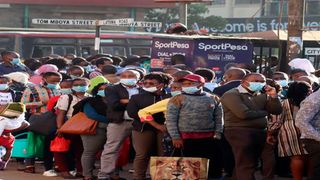
Nairobi residents wait in a long queue at the Latema Road stage on April 12, 2021, for passenger service vehicles to take them home before the 8pm curfew.
| Dennis Onsongo | Nation Media GroupNews
Premium
Covid-19: The problem with re-opening
What you need to know:
- According to Dr Gitahi, the government needs to invest in testing and genome sequencing to identify new strains.
As Kenyans celebrate relaxation of Covid-19 containment measures, including reopening of bars, experts are warning of a possible resurgence of the third wave of coronavirus.
The lifting of travel restrictions in and out of the disease Infected zone of Nairobi, Kiambu, Nakuru, Machakos and Kajiado counties on Saturday saw exodus from the region on Sunday amid fears of taking the virus to the village.
If Kenyans do not take individual responsibility and heed to public health protocols, Dr Githinji Gitahi, Global CEO Amref Health Africa said on Sunday, the third wave could “rebound very badly” in just weeks.
To him, it is not a matter of “if” but “when” the Covid-19 situation in India will be observed in Kenya if people fail to wear masks, sanitise and keep social distance.
India has become the new global epicentre of the virus, with more than 19 million cases. Daily infections have surpassed 200,000 over weeks as deaths retain at over 2,000.
“Some of us think that what is happening in India in terms of a rapidly spreading infection with many people requiring hospitalisation is not a matter of “if” but “when”, until adequate vaccination has been achieved,” he said in an interview with Nation.Africa.
Huge impact
While the reopening was inevitable, he said, the virus has not gone away and more cases and rising positivity may be witnessed in the near future.
“In managing pandemics’ impact on people’s lives and livelihoods, there is no perfect balance. It is like turning a light-dial, you keep doing that to ensure people are safe from hunger as they are from the virus,” he said.
His sentiments were echoed by Dr Yubrine Moraa Gachemba, a consultant internal medicine physician at The Nairobi Hospital.
“If we drop our guard, cases will start going up again in the next three weeks,” she said.
According to her, although the reopening of the Disease Infected Zone (DIZ) was not necessary it was determined by “a delicate balance of other social determinants of health”, and it is upon Kenyans to take individual responsibility if they want the status quo to be maintained.
The experts argued that the reopening was appropriate, especially due to the impact the closure had had on lives and livelihoods.
Also, the infection rate had been declining and continues to go down, particularly in the DIZ where the test positivity rate is around 10 percent, and hospitalisation has reduced.
Unfortunately, “there is a risk of an escalation in infection,” according to Dr Ahmed Kalebi, the former CEO of Lancet Group of Laboratories.
“There is a huge danger of rebound offshoot if public health measures advised by the government are not heeded, particularly masking and observing capacity in social gatherings as we are still above five percent positivity rate,” he said.
He warned that there is a real danger of more virulent variants from India taking root in the country.
“I think the cessation of flights to India came too late, what the government needs to do now is to be vigilant in tracing those who recently travelled from India and also up the genomic surveillance to detect these variants among positive cases in returning travelers or their contacts through contact tracing,” said Dr Kalebi.
But there is a problem with testing, contact tracing, treatment and sensitisation of Kenyans on the new symptoms of Covid-19, said Mr George Gibore, the Kenya Union of Clinical Officers (KUCO) Secretary-General.
Contact tracing
According to him, contact tracing has particularly collapsed in the country, meaning that there could be a silent spread and transmission of various Covid-19 strains.
“There must be a justification of closure of some counties and not others. While there are lot of tests being done in Nairobi, there are no ongoing tests in some other counties. Contact tracing is fundamental but it is not happening as it should, we are not happy about the whole situation,” he said.
He alleged that his recent visit to Kisumu, Kisii, Migori and Narok revealed that there was no testing going on, and as it is, it is not possible to know the full extent of the pandemic.
“If we can have enough testing, we could know the real picture of the pandemic. Looking at the number of infections, it is 10 percent and above, we have not flattened the curve,” he said, adding that there was no enough justification to lift the cessation of movement in the DIZ.
According to Dr Gitahi, the government needs to invest in testing and genome sequencing to identify new strains.
The Health ministry, he said, should also increase oxygen capacity in hospitals in preparation for any surge “as we wait for scale up vaccination.”
“The government should take time to urgently build oxygen production and delivery, including beds for those who may need admission, while at the same time doing everything possible to accelerate the vaccination efforts especially for this at the highest risk of severe disease, the elderly,” he said.
As of Sunday, 886,288 people had been vaccinated against the disease out of which 516,140 were aged 58 years and above and others.
On the same day, Kenya confirmed 396 new Covid-19 cases from a sample size of 4,496 as total infections since march 2020 hit 160,422. More than 108, 861 have recovered from the disease.





